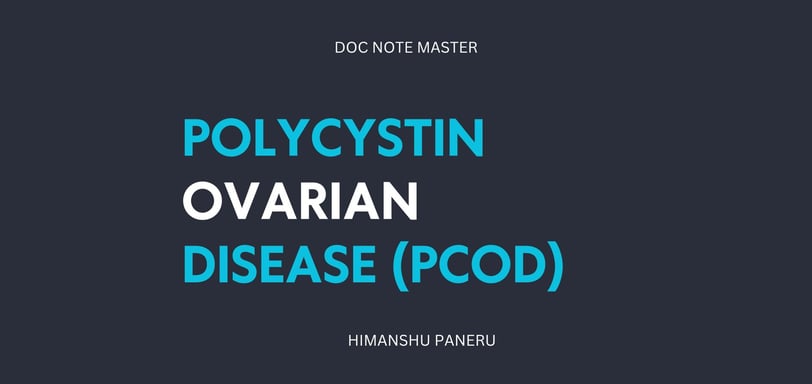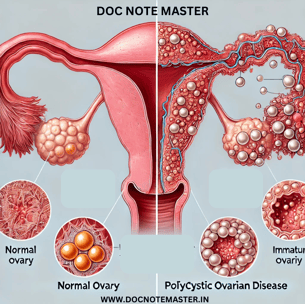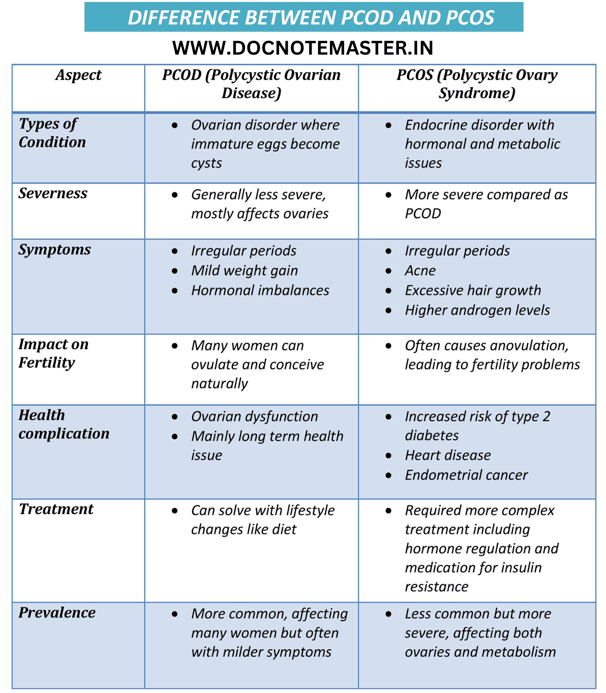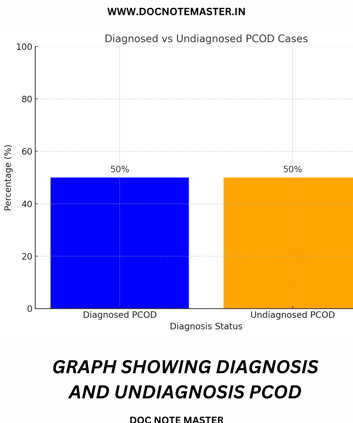online learning with Doc note master|| Himanshu paneru
POLYCYSTIN OVARIAN DISEASE
Polycystic Ovarian Disease (PCOD) is a hormonal disorder affecting women characterized by the formation of multiple small cysts on the ovaries. It often leads to irregular menstrual cycles & can cause symptoms like weight gain, acne, and excessive hair growth. PCOD is similar to Polycystic Ovary Syndrome (PCOS), the terms are sometimes used interchangeably, though PCOD is often considered a milder form of ovarian dysfunction.


POLYCYSTIN OVARIAN DISEASE (PCOD)
· PCOD stand for Polycystic Ovarian Disease
· PCOD is hormonal disorder that affect ovaries in women
· It is characterized by formation of large number of immature cysts in ovaries.
· PCOD is less severe than Polycystic ovary syndrome (PCOS)
· In PCOD small fluid filled sacs or cyst in the ovaries can lead to irregular menstrual cycle and other symptoms due to hormonal imbalance.
How PCOD affect women's
· PCOD affect women’s physical and mental health.
1. High prevalance:
· PCOD affect women in large number especially during reproductive age.
Note:- Reproductive age refer the age group in women between 15 to 49 years.
· It estimated that in every 10 out of 100 women suffering from pcod.
2. Infertility:
· PCOD can lead irregular or absent ovulation when lead infertility in women.
· Female suffering from pcod face problem during baby conceive.
3. Hormonal imbalance:
· Women with pcod produce high level of androgen (male hormone), which lead to symptoms such as excessive hair growth.
Difference between PCOD & PCOS
· PCOD & PCOD are often confusion because both condition involve the ovaries and the formation of cysts.
· Difference between pcod & pcos describe below in table:
Formation of cyst and their impact on ovaries
· The formation of cyst in pcod occur when multiple small, fluid filled sacs develop within the ovaries.
Formation of cysts
1. Impaired ovulation:
· In impaired doesn’t occur properly i.e the immature follicle remain in the ovaries as small fluid filled cyst. After some time these cyst accumulate causing the ovaries to enlarge.
2. Hormonal imbalance:
· In pcod ovaries produce excessive amount of androgen which cause irregular menstrual cycle.
3. Shape, size of ovaries:
· The ovaries may become large in size & contain numbers small cysts.
Cause of PCOD
· Exact cause of Polycystic ovarian disease is not clear but several factor which is responsible for developing pcod in body is genetic factor, hormonal imbalance infection, inflammation & thyroid dysfunction.
· PCOD is caused by a mix of genetic hormonal & life style factor, hormonal imbalance play a major role & lifestyle choice like diet, exercise & stress management can significantly impact the condition.
· Cause of pcod can symmerized below:-
1. Genetic: women with a family history of pcod, pcos are more likely to develop the condition.
2. Hormonal imbalance: women with pcod produce higher level of androgen than usually which interfere with ovulation
3. Increase LH level: Luteizing hormone (LH) level increase in women during pcod
4. Insulin resistance: women with pcod have insulin resistance (less responsive to insulin).
5. Obesity: excessive body weight is common cause of pcod
6. Thyroid dysfunction: hypothyroidism commonly seen in pcod women
Symptoms in PCOD
· Women with pcod can experience a broad spectrum of symptoms including:
Irregular menstrual cycle
Acne
Oily skin
Infertility
Hair growth on face, chest
Weight gain
Obesity
Fatigue
Pelvic pain
Skin patches
Decrease breast size
Anxiety
Infertility
Diagnosis of PCOD
· Diagnosis in pcod involve number of test to diagnosis pcod. It include
1. Medical history:
· Your healthcare provider ask for frequency & regularity of menstrual cycle, irregularity in periods or heavy bleeding.
2. Family history:
· A family history of pcod, type 2 diabetes, etc.
3. Blood test:
a. Examine hormone level:- It include testosterone level, Luteizing hormone (LH) & Follicle stimulating hormone (FSH)
b. Thyroid function: thyroid test (T3,T4, TSH) done to find out thyroid disorder.
c. Prolactin: Elevated level of prolactin can cause menstrual irregularities.
4. Ultrasound:
· An ultrasound is common test to examine the ovaries. In pcod the ovaries often enlarged and contain multiple small cysts.
Treatment in PCOD
1. Medication:
· Birth control pill:- it help to regulate your periods, reduce acne, & lower androgen level.
· Metformin:- used to control diabetes and improving insulin sensitivity.
2. Lifestyle changes:
· Diet:- eating more vegetable, whole grain, lean proteins
· Weight loss:- in pcod weight loss can improve many symptoms
3. Emotional and mental health support:
· PCOD can some time lead to stress, anxiety or depression.
· For maintain stress do regular yoga, meditation
Complication in PCOD
· Complication associated with pcod are:
Infertility
Diabetes
Heart problems
Uterine cancer
Mental health issue
Pregnancy issue
Liver problem






About author
Himanshu Paneru is the founder and author of DOC NOTE MASTER,
a platform dedicated to sharing insightful articles on medical topics
and education. Currently pursuing a master’s degree in Medical
microbiology at Netaji subhash chandra bose sybharti medical
college Dehradun, Uttarakhand. Himanshu combines his academic
knowledge with a passion for writing.


